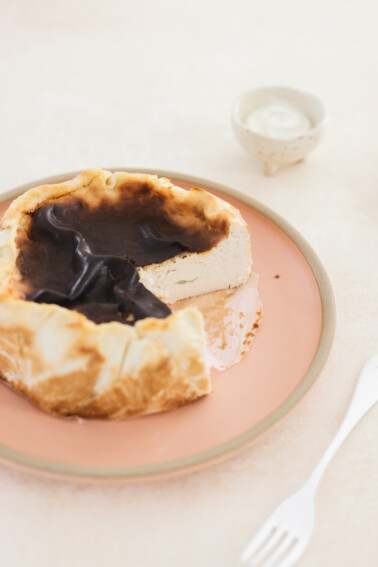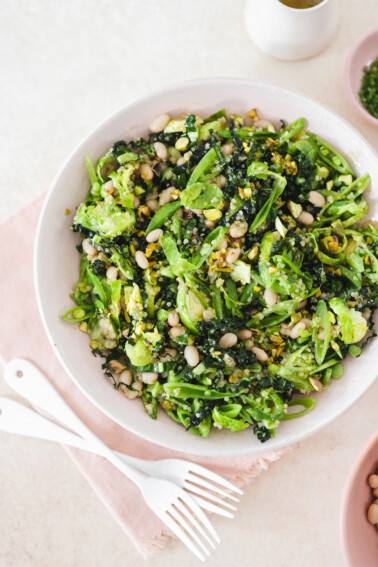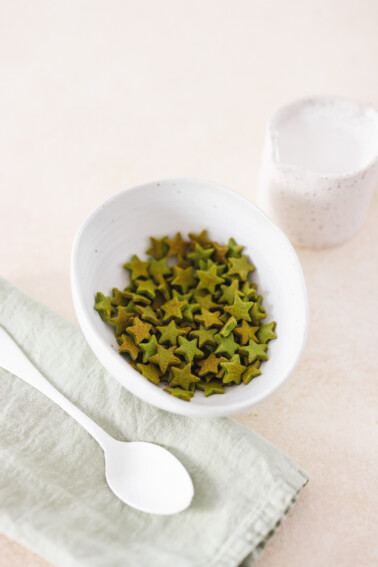This page may contain affiliate links, which means I will make a small commission for products purchased through my link.
This vegan Chawanmushi recipe is a dairy-free and egg-free twist on a creamy egg custard flavored with fish-free dashi. It’s a delicious and light snack, breakfast, or side dish.

What is Chawanmushi?
Chawanmushi is a traditional Japanese savory egg custard dish. The name “Chawanmushi” means “steamed in a teacup” in English. “Chawan” refers to a type of bowl or teacup used for serving, and “mushi” means to steam. This dish is typically served as an appetizer or side dish in Japanese cuisine.
Chawanmushi consists of a smooth and silky custard made from a mixture of eggs, dashi stock, and soy sauce. The custard is then steamed with various ingredients such as seafood, chicken, mushrooms, shrimp, or vegetables in its own heat-proof bowl or container. The resulting dish is delicate with a silky texture and is garnished with toppings like thinly sliced green onions, kamaboko (fish cake), or a sprinkle of yuzu zest.
Unfortunately, as you probably guessed, it’s not vegan! The egg + the dashi broth (which contains bonito flakes/fish flakes) are both derived from animals. But fear not! My chawanmushi recipe is made with vegan substitutes so that everyone can enjoy this tasty dish.
What Makes This Recipe Great
A chawanmushi recipe is traditionally made by seasoning eggs with dashi (a broth made with seaweed and fish flakes) and steaming them into a spoonable custard. My version is totally vegan, however, which means no fish in the dashi and no eggs!
You might be wondering how in the world we get an egg custard to taste like the classic without any eggs but trust me, it works! We achieve that silky smooth texture with silken tofu, and it’s absolutely delicious!
Ingredients for Vegan Chawanmushi
Here’s what you need to make this chawanmushi recipe without eggs:
- Silken tofu. This is how you achieve the silky-smooth texture of traditional steamed eggs.
- Miso paste. Use white miso paste to maintain the creamy color. This adds savory flavor, so you don’t need the fish.
- Tamari. You can also use gluten-free soy sauce or regular soy sauce if you’re not gluten-free.
- Mirin. This is seasoned Japanese rice wine, which is easy to find at most grocery stores.
- Potato Starch.
- Salt.
- Coconut sugar. You just need a tiny pinch of sugar to enhance the flavor of the custard. You can use regular sugar if you prefer.
- Vegetables. I like to add leeks, shiitake mushrooms, and carrots, all cut into thin slices, as fillings for my chawanmushi. They add natural sweetness.
Step-by-Step Instructions
- Begin by preparing your “egg” base. Blend the silken tofu, tamari, mirin, coconut sugar, potato starch, and salt in a blender or food processor until smooth.
- Prepare 2 small ramekins and layer the egg mixture and filler ingredients like mushroom, leek, and carrot as desired. Top it off with a few decorative ingredients, and it’s ready to steam.
- Bring hot water to a boil over medium-high heat in a large, shallow pan. Reduce to low heat to maintain a simmer, and add your ramekins. Alternatively, use a steamer basket. Steam for about 15 minutes until the mixture has firmed up, and enjoy.
Expert Tips
- Steamer Basket: You can cook this steamed custard in a steamer basket if you like. But I find that it’s easy to cook the custard in heat-proof ramekins in a wide, shallow pot filled with a few inches of water.
Serving Tips
- You can serve this steamed tofu custard with your favorite Japanese condiments. I like to garnish with soy sauce and chili oil for some heat.
Storage Tips
- To store this vegan Chawanmushi recipe, let the dish cool down. Then, transfer it to an airtight container. Store in the fridge and consume within 2-3 days—reheat before serving if desired.
Recipe FAQs
What is a chawanmushi in English?
In English, Chawanmushi means “Japanese savory egg custard” or simply “steamed egg custard.”
Is chawanmushi high in protein?
Yes! Whether you make the traditional version or this one with tofu, it’s a high-protein dish.
Why is my chawanmushi watery?
There are a few possible reasons for watery Chawanmushi: not cooked long enough, wrong ingredient ratios (too much liquid), or overcooking. Be aware of these common issues while cooking. This vegan version is easier to get right because you’re not worried about the dashi ratio or egg overcooking.
More Japanese Recipes
Homemade Japanese Rice Crackers (Senbei)
Kashiwa Mochi (Japanese Rice Cake with Oak Leaf)
If you make this recipe, be sure to let me know what you think with a star rating and comment below! Follow me on Instagram for more delicious recipes!
Vegan Chawanmushi Recipe (Japanese Egg Custard)

Ingredients
- 12 oz silken tofu
- 1 tsp white miso paste
- 1/2 tsp tamari or gluten free soy sauce
- 1 tsp mirin
- 1/2 tsp coconut sugar
- 2 tsp potato starch
- salt to taste
- 1 small leek stem thinly sliced
- 2 shiitake mushrooms thinly sliced
- 1/2 medium carrot sliced
Instructions
- Begin by preparing your "egg" base. Blend or food process silken tofu, tamari, mirin, coconut sugar, potato starch and salt until smooth.
- Prepare 2 small ramekins and layer the egg mixture and filler ingredients like mushroom, leek and carrot as desired. Top it off with a few decorative ingredients and it's ready to steam.
- Simmer hot water in a large, shallow pan and your ramekins. Alternatively, use a steamer basket. Steam for about 15 minutes, until the mixture has firmed up and enjoy.
Notes
Expert Tips
- Steamer Basket: You can cook this steamed custard in a steamer basket if you like. But I find that it's easy to cook the custard in heat-proof ramekins in a wide, shallow pot filled with a few inches of water.
Serving Tips
- You can serve this steamed tofu custard with your favorite Japanese condiments. I like to garnish with soy sauce and chili oil for some heat.
Storage Tips
- To store this vegan Chawanmushi recipe, let the dish cool down. Then, transfer it to an airtight container. Store in the fridge and consume within 2-3 days—reheat before serving if desired.
Nutrition information is automatically calculated, so should only be used as an approximation.



